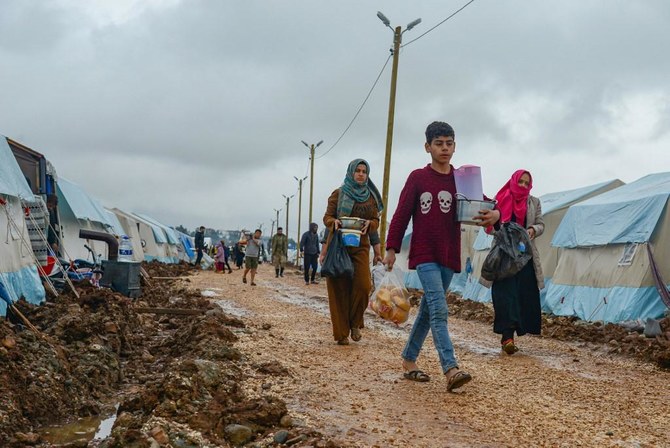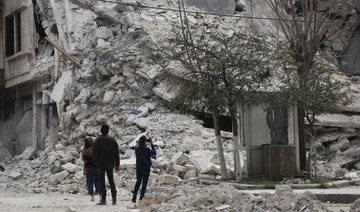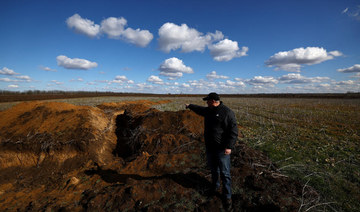BRUSSELS: The European Union and international donors on Monday pledged seven billion euros ($7.5 billion) to help Turkiye and Syria in the aftermath of the earthquake that devastated parts of the neighboring countries last month.
Ursula von der Leyen, the president of the EU’s executive arm, said 3.3 billion euros ($3.5 billion) of the total amount will be raised by the 27-nation bloc.
The magnitude 7.8 earthquake on Feb. 6 killed more than 52,000 people — the vast majority in Turkiye. Nearly 300,000 buildings in Turkiye either collapsed or were severely damaged, according to the country’s president.
“We have shown to the people in Turkiye and Syria that we are supporting those in need,” Von der Leyen said, adding that the global pledge included 1.1 billion euros from the EU’s executive arm, and 500 millions from the European Investment Bank, backed by the EU budget.
Turkish President Recep Tayyip Erdogan addressed the conference via videolink and described some of the reconstruction challenges, including deadly floods that hit parts of the earthquake zone last week.
“Some of the aftershocks have been going on for a while and they are of equal magnitude to a separate earthquake,” he said. “We have been fighting against the flood disasters and challenging weather conditions.”
Erdogan said some 298,000 buildings across 11 provinces affected by the earthquake were destroyed or left unfit for use.
“No single country can fight against such a disaster, regardless of its level of economic development,” he said, putting the cost of reconstruction at $104 billion. “Your contributions made at this conference will contribute to the healing of wounds and wipe clean the traces of this disaster.”
The conference hosted by the European Commission and Sweden — which holds the rotating presidency of the EU — was attended by NGOs, G-20 countries and UN members as well as international financial institutions.
Survivors of the earthquake in rebel-held northwest Syria have received very little assistance because of deep divisions exacerbated by the country’s 12-year war. The EU said 15.3 million Syrians of a population of 21.3 million already required humanitarian assistance before the earthquake struck.
The bloc has been providing humanitarian aid to Syria since 2011 and wants to step it up. But it does not intend to help with reconstruction in the war-torn country, with EU sanctions against the Syrian regime of President Bashar Assad in place due to its continued crackdown against civilians.
Von der Leyen said the Commission pledged an additional 108 million euros ($115.8 million) in humanitarian aid for Syria on Monday.
“All together we managed to raise with our partners 950 million euros ($1 billion) for the people in Syria,” she said. “This is just the first step.”
The International Rescue Committee, an aid group responding to humanitarian crises, had urged donors to ensure that the UN’s appeal for Turkiye and Syria — calling for $1 billion and $397 million respectively — is fully funded.
“The people affected by this devastating earthquake are relying on donors meeting in Brussels to step up this week,” said Tanya Evans, the IRC’s Country Director in Syria. “They need to ensure that funding is available for life-saving items including food, shelter, warm clothes and clean water, as well as support to the already weak health care system including the provision of medicines and medical equipment. If they fail to do so, the most vulnerable will pay the price,” she added.
Donors pledge $7.5 billion for Turkiye, Syria after quake
https://arab.news/zzn59
Donors pledge $7.5 billion for Turkiye, Syria after quake

- Nearly 300,000 buildings in Turkiye either collapsed or were severely damaged, according to Erdogan
- “We have shown to the people in Turkiye and Syria that we are supporting those in need,” Von der Leyen said
Israel yet to respond to French Lebanon proposals, French ministry says

- The written proposal also looks at long-term border issues
PARIS: Israel has not given a response to France on Paris’ proposals to reduce tensions between Israel and Lebanon’s Iran-backed Hezbollah, France’s foreign ministry spokesperson said on Thursday.
Israel and Hezbollah have been engaged in escalating daily cross-border strikes over the past months — in parallel with the war in Gaza — and their increasing range and sophistication has raised fears of a wider regional conflict.
France has historical ties with Lebanon and has proposed written proposals to both sides that would see Hezbollah’s elite unit pull back 10 km (6 miles) from the Israeli border, while Israel would halt strikes in southern Lebanon.
Foreign Minister Stephane Sejourne went to both Lebanon and Israel in April to push France’s efforts, and Israel’s foreign minister was in Paris earlier this month. Lebanon’s foreign minister was in Paris for talks on Wednesday.
“We have had a relatively positive response from the Lebanese, but I think we have not had any return from Israel at this point,” Christophe Lemoine told reporters in a daily briefing.
The written proposal also looks at long-term border issues and had been discussed with partners including the United States, which has its own efforts to ease tensions and exerts the most influence on Israel.
The Shiite Muslim Hezbollah has amassed a formidable arsenal since a 2006 war with Israel and since October thousands of people on both sides of the border have been displaced by the clashes.
US envoy condemns attacks on Western-linked brands in Baghdad

- A stun bomb exploded at 1:20 am in front of a dealership of the US construction equipment company Caterpillar
- Ten minutes later, a blast went off in front of the Cambridge Institute in nearby Palestine Street
BAGHDAD: The US ambassador to Iraq denounced attacks Thursday targeting Western-linked brands in Baghdad this week, as anger grows across the Middle East over Israel’s war in Gaza.
A stun bomb exploded at 1:20 am in front of a dealership of the US construction equipment company Caterpillar in the Jadriyah neighborhood of Baghdad, the Iraqi security forces said.
Ten minutes later, a blast went off in front of the Cambridge Institute in nearby Palestine Street, which a resident identified as a likely Iraqi-owned language learning center.
On Sunday, a makeshift bomb was thrown at a branch of the US fast-food chain KFC, causing minor damage. The next night, masked men broke into another branch, smashing glass.
“We condemn recent violent attacks against US and international businesses,” the US ambassador to Baghdad, Alina Romanowski, said on social media platform X.
She urged the Iraqi government to “conduct a thorough investigation, bring to justice those who are responsible, and prevent future attacks.”
“These attacks endanger Iraqi lives and property, and could weaken Iraq’s ability to attract foreign investment,” the US diplomat added.
The Iraqi security forces said Thursday’s attacks, whose motives remained unknown, did not cause any damage or injuries, adding they were a “desperate attempt to harm Iraq’s reputation.”
After the KFC attacks, security forces said they had arrested several suspects.
Since the war in Gaza started in October, a boycott movement spearheaded by pro-Palestinian activists has targeted major Western brands, such as Starbucks and McDonald’s.
Iraq does not recognize Israel’s statehood, and all of its political parties support the Palestinian cause.
Earlier this week, influential Iraqi cleric Moqtada Sadr renewed his calls to close the US embassy in Baghdad “through diplomatic means without bloodshed,” after an Israeli strike killed dozens of civilians in a camp in Gaza.
Syria’s main insurgent group blasts the US Embassy over its criticism of crackdown on protesters

- The group said Washington should instead respect protesters at American universities who have demonstrated against the war in Gaza
- The statement by the US Embassy in Damascus came after months of protests against Hayat Tahrir Al-Sham
IDLIB, Syria: The main insurgent group in rebel-held northwest Syria blasted the US on Thursday over its criticism of a crackdown on protesters in areas outside government control.
The group said Washington should instead respect protesters at American universities who have demonstrated against the war in Gaza.
The statement by the US Embassy in Damascus came after months of protests against Hayat Tahrir Al-Sham, or HTS, in Syria’s northwestern Idlib province by people opposed to the rule of the group that was once known as the Nusra Front, the Syria branch of Al-Qaeda. The group later changed its name several times and distanced itself from Al-Qaeda.
Anti-HTS sentiments had been rising for months following a wave of arrests by the group of senior officials within the organization.
Earlier this month, HTS members attacked protesters demanding the release of detainees with clubs and sharp objects outside a military court in Idlib city, injuring several people. Days later HTS fighters fired into the air and beat protesters with clubs, injuring some of them as protests intensified to demand the release of detainees and an end to the group’s rule.
The rebel-held region is home to more than 4 million people, many of them displaced during the conflict that broke out in March 2011 and has so far killed half a million people.
The conflict began with protests against President Bashar Assad’s government before turning into a deadly civil war that left large parts of the country in ruins.
The US Embassy in Damascus posted on the social media platform X on Wednesday that it supports “the rights of all Syrians to freedom of expression and peaceful assembly, including in Idlib.”
It added that “we deplore Hayat Tahrir Al-Sham’s regime-style intimidation and brutality against peaceful protesters as they call for justice, security, & respect for human rights.”
HTS responded in a statement saying that “liberated areas enjoy a safe environment for the expression of opinion” as long as they don’t aim to destabilize the region and spread chaos. It added that the US Embassy should back the Syrian people aiming to achieve “freedom and dignity against a criminal regime.”
“The rights of university students in the United States should be preserved and their demands in supporting the Palestinian people and Gaza should be respected,” HTS said in a statement.
Qatar’s offer to build 3 power plants to ease Lebanon’s electricity crisis is blocked

- Cost and space issues in urban areas have also limited solar use
- People currently get an average of four hours of electricity a day from the state company
BEIRUT: Lebanon’s political class, fuel companies and private electricity providers blocked an offer by Qatar to build three renewable energy power plants to ease the crisis-hit nation’s decades-old electricity crisis, Lebanese caretaker economy minister said Thursday.
Lebanon’s electricity crisis worsened after the country’s historic economic meltdown began in October 2019. Power cuts often last for much of the day, leaving many reliant on expensive private generators that work on diesel and raise pollution levels.
Although many people have installed solar power systems in their homes over the past three years, most use it only to fill in when the generator is off. Cost and space issues in urban areas have also limited solar use.
Qatar offered in 2023 to build three power plants with a capacity of 450 megawatts — or about 25 percent of the small nation’s needs — and since then, Doha didn’t receive a response from Lebanon, caretaker Economy Minister Amin Salam said.
Lebanon’s energy minister, Walid Fayyad, responded in a news conference held shortly afterward that Qatar only offered to build one power plant with a capacity of 100 megawatts that would be a joint venture between the private and public sectors and not a gift as “some claim.”
Salam said that after Qatar got no response from Lebanon regarding their offer, Doha offered to start with a 100-megawatt plant.
Lebanon’s political class that has been running the country since the end of 1975-90 civil war is largely blamed for the widespread corruption and mismanagement that led to the country’s worst economic crisis in its modern history. Five years after the crisis began, Lebanon’s government hasn’t implemented a staff-level agreement reached with the International Monetary Fund in 2022 and has resisted any reforms in electricity, among other sectors.
People currently get an average of four hours of electricity a day from the state company, which has cost state coffers more than $40 billion over the past three decades because of its chronic budget shortfalls.
“There is a country in darkness that we want to turn its lights on,” Salam told reporters in Beirut, saying that during his last trip to Qatar in April, officials in the gas-rich nation asked him about the offer they put forward in January 2023.
“The Qatari leadership is offering to help Lebanon, so we have to respond to that offer and give results,” Salam said. Had the political leadership been serious in easing the electricity crisis, he said, they would have called for emergency government and parliamentary sessions to approve it.
He blamed “cartels and Mafia” that include fuel companies and 7,200 private generators that are making huge profits because of the electricity crisis.
“We don’t want to breathe poison anymore. We are inhaling poison every day,” Salam said.
“Political bickering is blocking everything in the country,” Salam said referring to lack of reforms as well as unsuccessful attempts to elect a president since the term of President Michel Aoun’s term ended in October 2022.
Lebanon hasn’t built a new power plant in decades. Multiple plans for new ones have run aground on politicians’ factionalism and conflicting patronage interests. The country’s few aging, heavy-fuel oil plants long ago became unable to meet demand.
Iran’s Supreme Leader Khamenei hosts Syria’s Assad in Tehran

- Assad and Khamenei said ties were strong
TEHRAN: Syrian President Bashar Assad met Iran’s Supreme Leader Ayatollah Ali Khamenei, a close ally, in Tehran on Thursday to offer condolences for the death of President Ebrahim Raisi, Iran’s Student News Network (SNN) reported.
Raisi died when his helicopter crashed on May 19 near the Azerbaijan border.
Khamenei and Assad met last in 2022 in Tehran, during which both sides called for stronger relations.
On Thursday, Assad and Khamenei said ties were strong, according to a statement by the Syrian presidency.
Assad was able to turn the tide of Syria’s civil war, which erupted from mass pro-democracy demonstrations in 2011, with crucial help from Iran’s proxy militias and Russia’s military intervention in 2015.
Israel, whose existence is not recognized by the Islamic Republic, has mounted frequent attacks on what it has described as Iranian targets in Syria, where Tehran-backed forces including Lebanon’s Hezbollah militia have deployed over the past decade to support Assad in Syria’s war.






















